High school students learn to make movies like the pros
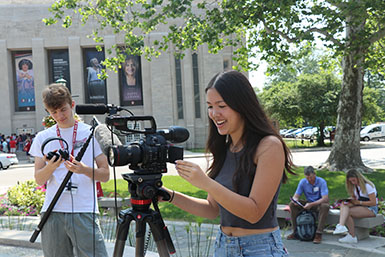
The summer sun beamed down upon IU Bloomington’s campus, making the green of the leaves grow even more vibrant. Birds chirped and squirrels roamed, and Showalter Fountain’s sound of bubbling water laid beneath the voices of high school students standing in front of it. The students gathered around a camera and tripod, watching rising senior Julia Kim adjust it for the next shot of their short film.
“I came here because it was a precollege film opportunity,” Kim said. “You know, there are some film opportunities, but this one seemed very professional and (with) very much ability to learn with people that are like-minded, have the same set of skills, and at the same level as me.”
Digital Cinema Academy
Kim was one of the high school students attending the Digital Cinema Academy, hailing from Florida. The Media School’s Cinema Academy hosts the Digital Cinema Academy session each summer, inviting high school students interested in film from all over the country—and even from other countries—to work alongside each other on short films. This summer, the academy was from June 11-16.
“I felt like this was a very good opportunity to develop my ideas and see if this is good to learn and what the uses could be for this kind of career,” said Simon Tuite, a rising senior from Argentina. “For me, it gives a security of ‘this is what I want to do.’ I believe that it is very good to start the sooner you can.”
Students were sorted into groups and given roles in the filmmaking process working as a team during the five-day program. The program is highly selective and limited to 20 students with an advanced skill level in filmmaking. During the program, the students get to work alongside their peers and gain access to professional-level resources such as studios, cameras, and other audio and video equipment. On the final day, students showcased their films to the group and family members.
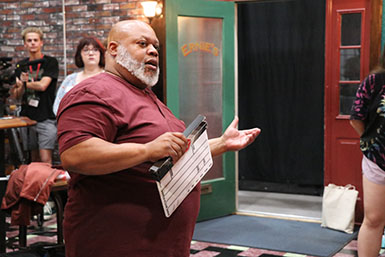
Students also learn from specialists in the filmmaking industry, from guest speakers to experts here at IU. Senior lecturer Bear Brown was a prominent mentor for the group of students as they explored their talents.
Camp counselors oversaw each student group and helped guide and assist them in their filmmaking processes. Melanie Taylor, an incoming senior in the B.F.A program for cinematic arts, was one of these camp counselors, and she accompanied Kim’s group.
“It’s seriously so fun because almost all of them (the students) are so energetic. I love seeing how ambitious and the gumption that they have,” Taylor said. “I think that anyone—no matter the age—can have really cool ideas.”
Taylor expressed excitement to observe the students’ filmmaking. She had never been to a camp like this and believed it to be an important experience for students preparing to pursue a career in film. She said that seeing not only experts but also slightly older students doing career-based projects can solidify the possibility of having that career in a high school student’s mind.
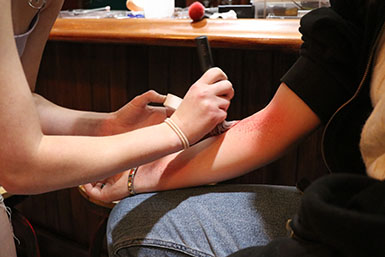
“Because it’s not until you see alumni that you’re like ‘oh, I can have a job like that too? That’s so cool!’,” Taylor said. “So I think it’s awesome that we have that. I kind of wish I went to one of these.”
The Cinema Academy hosted three other summer precollege programs, which are also dedicated to letting high school students explore their interests in the world of film.
Animation Camp
Eighteen high school students came to campus for Animation Camp from June 12-16, a program aiming to introduce them to the features of digital animation for film, television, and video games. Students worked with motion capture, key framing, and other professional-level equipment and software to help them develop their skills.
Game art senior lecturer Rush Swope was the students’ mentor for the week. Swope has an extensive background in game design, believing games can be art. He has worked on games and film projects including Guerilla Games’ “Killzone 2,” “PlayStation All-Stars Battle Royale,” Telltale Games’ “Tales from the Borderlands,” the motion capture for the film “Warcraft,” and “Game of Thrones.”
Swope was also involved in a project making a virtual version of Franklin Hall inspired by Hogwarts for the annual game design commencement celebration in 2020 during quarantine.
Short Film Bootcamp
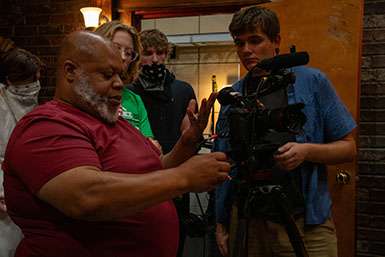
Whilst the Digital Cinema Academy is for more advanced students, the Short Film Bootcamp serves as an introduction to filmmaking.
From July 10-14, the Short Film Bootcamp covered the basics of moviemaking, from cameras and lenses to sound production and lighting. Students made both individual and group projects, learning the art of documentary, experimental, and narrative filmmaking.
Brown was also a leader in this program, explaining and demonstrating the cameras and the various uses of their equipment. Students were allowed to utilize Studio 5 as well as any parts of campus, like the Hoagy Carmichael Landmark Sculpture or classrooms in the Radio-Television Building.
Students learned from IU faculty and staff specialized in the industry, met other students sharing their interest in film, and gained experience in group film work, which is essential for the industry.
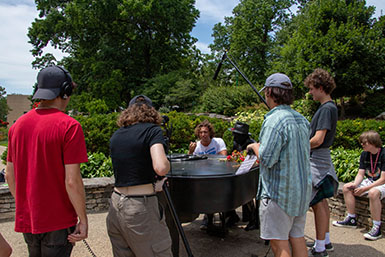
The Short Film Bootcamp, Digital Cinema Academy, and Animation Camp all gave students an important resource that not all of them had: a place and time to practice.
“I think with film it can always be difficult to practice, especially when you’re younger and in high school because you don’t have the best equipment, or maybe you don’t have a lot of people who can help you,” said Rachel Rath, a sophomore from Kokomo, Indiana. “So I think it’s important that you can collaborate with all these people with this fancy equipment.”
Screenwriting Academy
The final precollege program held this summer was the Screenwriting Academy. The Screenwriting Academy was a five-day program held virtually and happened from July 17-21. During the camp, aspiring screenwriters learned from expert producers and screenwriters, listening to guest lectures and discussing with them. Students analyzed critical cinematic work that helped shape the history of screenwriting.
Students left the program with their own scripts for a short film, a new network of fellow filmmakers and mentors, and the knowledge of how to continue developing their skills with their future work.
Each of these summer programs gives students a place to practice and explore their career paths in the film industry and opens new doors and opportunities for them. Students learned a variety of skills, how to work alongside one another, and important tips on succeeding in film and animation. They also met new friends and connections, hearing advice from accomplished figures in the field.
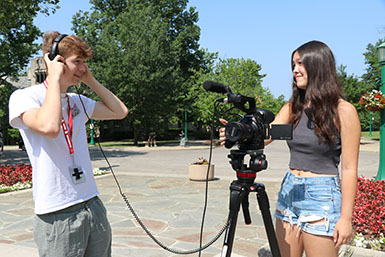
Not only did these precollege camps teach students career-related skills, but they also gave them a taste of what college life will be like should they decide to go. Students who selected the overnight options for camps stayed in dorms, and most meals were at dining halls. They were also able to explore the Bloomington campus and The Media School while shooting films.
Finally, these camps gave students access to top-tier resources and equipment that can be difficult to obtain. From boom mics, cameras, and lighting equipment to video editing software and motion capture equipment, students were able to enjoy and become familiar with technology commonly used in the field.
Students gained useful career experience and new knowledge of how things work all while pursuing their interests.

